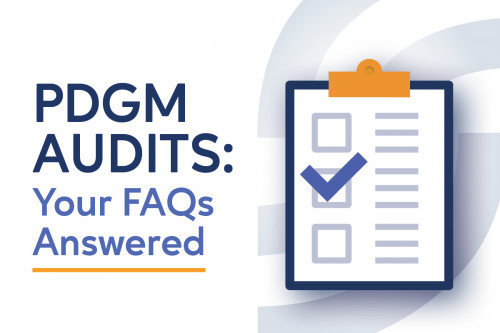The Patient-Driven Groupings Model (PDGM) has brought significant changes to the home health industry. One of the most important changes is the increased emphasis on quality. PDGM audits are comprehensive reviews of home health coding and OASIS practices. These audits hold significant importance for several reasons. They serve as a crucial mechanism for verifying agency compliance with CMS regulations, thereby ensuring adherence to established industry standards.
PDGM audits are an essential tool for home health agencies, helping them to maximize reimbursement and improve patient care. By carefully reviewing ICD-10 coding and OASIS scores, these audits can identify areas where agencies can improve their coding and OASIS practices, as well as potential risks and vulnerabilities.
This information allows agencies to take corrective action and ensure that they are receiving the full reimbursement they deserve, while also providing the highest quality care to their patients. Let’s break down everything your agency needs to know in this post!
What are PDGM audits?
PDGM audits review an agency's ICD-10 coding and OASIS assessments. Auditors will look for any areas where the agency's primary and comorbidity codes could have been more appropriate, or OASIS responses could have been improved. By using pre and post-audit results, agencies could realize potential reimbursement opportunities or any at-risk reimbursement penalties.
Why are PDGM audits important in home health?
There are several reasons why PDGM audits are important for home health agencies:
- Guidance: PDGM audits can help agencies identify and correct any coding or OASIS deficiencies. This can help agencies avoid costly penalties from CMS.
- Revenue optimization: PDGM audits can help agencies identify any missed revenue opportunities, such as incorrectly coded diagnoses or procedures. PDGM audits can help agencies assess the cost-effectiveness of outsourcing their coding and OASIS reviews.
- Quality improvement: PDGM audits can help agencies identify areas where they can improve the quality of their care, such as by ensuring that OASIS documentation is complete and accurate, or to identify areas where their staff need additional training on coding and OASIS guidelines.
Read our article on maximizing revenue and profitability to understand how your agency can benefit from a PDGM analysis.
In addition to the primary reasons mentioned earlier, PDGM audits offer additional advantages for agencies, enabling them to:
- Enhance Their Understanding of the PDGM Payment Model: PDGM audits serve as a valuable tool for agencies to gain a deeper comprehension of the PDGM payment model and its direct impact on their reimbursement structure.
- Identify Opportunities for Enhancement in Coding and OASIS Practices: PDGM audits are instrumental in pinpointing areas where agencies can refine their coding and OASIS practices, resulting in heightened accuracy and compliance levels.
- Establish Performance Benchmarks against Peers: PDGM audits empower agencies to benchmark their performance against other organizations in terms of coding and OASIS precision. This comparative analysis aids agencies in identifying specific areas for improvement.
Learn more about how data can pinpoint where OASIS training is most needed and how OASIS responses are used to drive PDGM payment in this blog post.
What are the key areas that PDGM auditors typically focus on?
PDGM auditors typically focus on the following key areas:
- Primary diagnosis codes: Auditors will review primary diagnosis codes to ensure that they are accurate and supported by the patient's medical record.
- Comorbidity adjustment opportunities: Auditors will identify any comorbidity adjustment opportunities that have been missed.
- Outcome impact to key M items on the OASIS: Auditors will review key M items on the OASIS to assess the impact of coding adjustments on the patient's case mix weight.
By focusing on these key areas, auditors can identify and correct any coding and OASIS-E assessment errors that may be impacting the agency's reimbursement and compliance.
How can home health agencies prepare for PDGM audits?
Home health agencies can prepare for PDGM audits by taking the following steps:
- Invest in coding and OASIS education: Staff members who are responsible for coding and OASIS submissions should be properly trained and certified. Consistent updates to Coding and OASIS guidance should be monitored and appropriate staff education provided. Consider investing in Decision Health Coding Center which provides live updates to coding guidance frequently changes.
- Consider outsourcing coding and OASIS reviews: Outsourcing these tasks to a qualified specialist can be a cost-effective way to improve compliance and maximize reimbursement.
SimiTree offers comprehensive PDGM audits that are conducted by experienced professionals. Our auditors will review your agency's ICD-10 coding and OASIS assessments to identify any areas of concern. We will also provide you with a detailed report of our findings and recommendations.
How SimiTree Can Help
SimiTree offers comprehensive PDGM audits that are tailored to the specific needs of each agency. Our auditors are experts in ICD-10 coding and OASIS assessments, and they will work with you to identify any areas of vulnerability and overlooked reimbursement opportunities.
For the next 30 days, we are offering NEW clients a 30% discount on PDGM audits.
Submit a request form to learn more about how SimiTree's PDGM audits can help your agency and to take advantage of this incredible opportunity.
If you're looking to improve your agency's coding and OASIS-E assessments, don't hesitate to reach out to us with the contact form below or call us today at 866.839.5471.
Visit our Coding and OASIS Outsourcing page for more: http://bit.ly/3ZW55w5
To learn more on this topic, visit the following articles:
Maximizing Revenue and Growth: 3 Reasons your Home Health Agency needs SimiTree's PDGM Analysis
Data pinpoints where OASIS training most needed
Top 3 Struggles with OASIS-E: How to overcome increased workload, new data sets, and more

